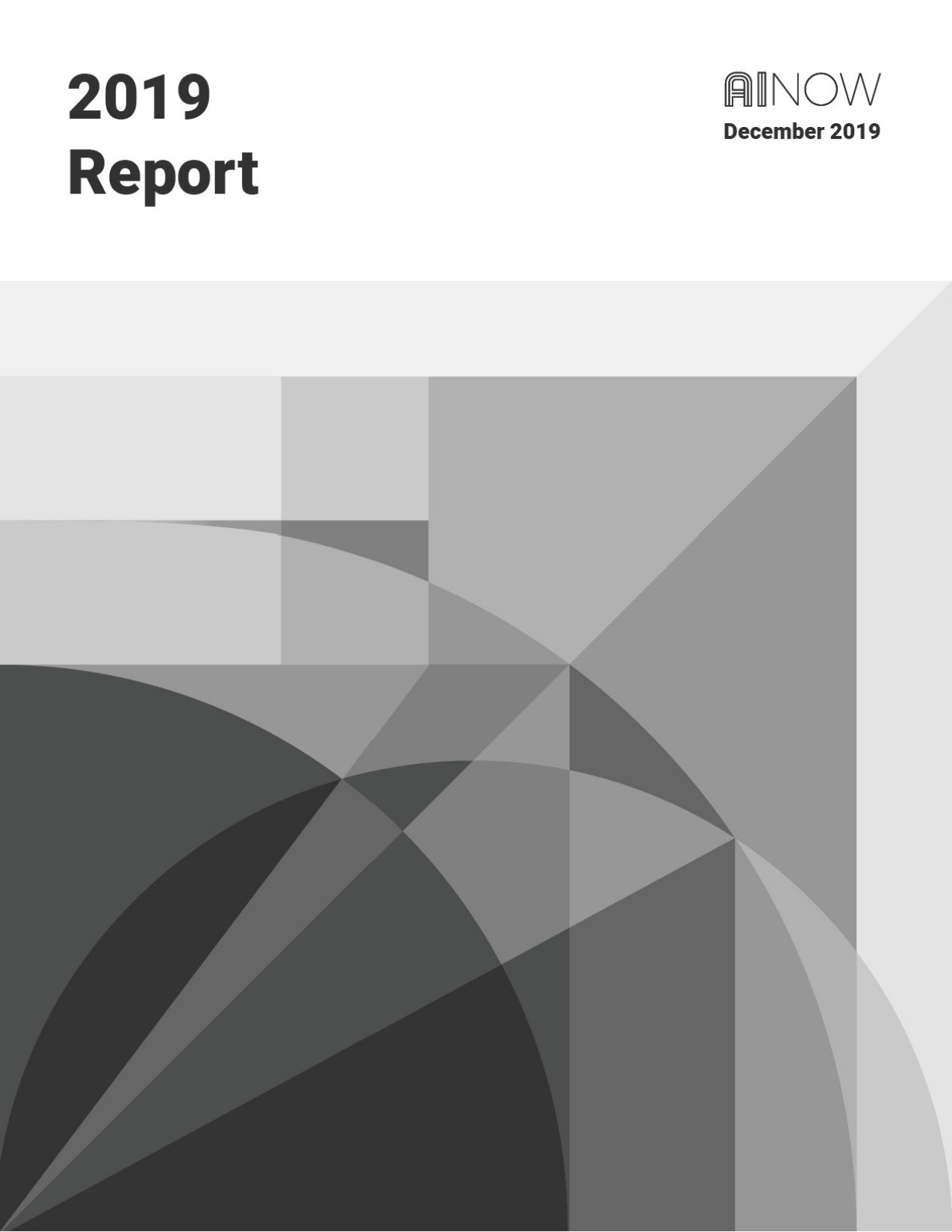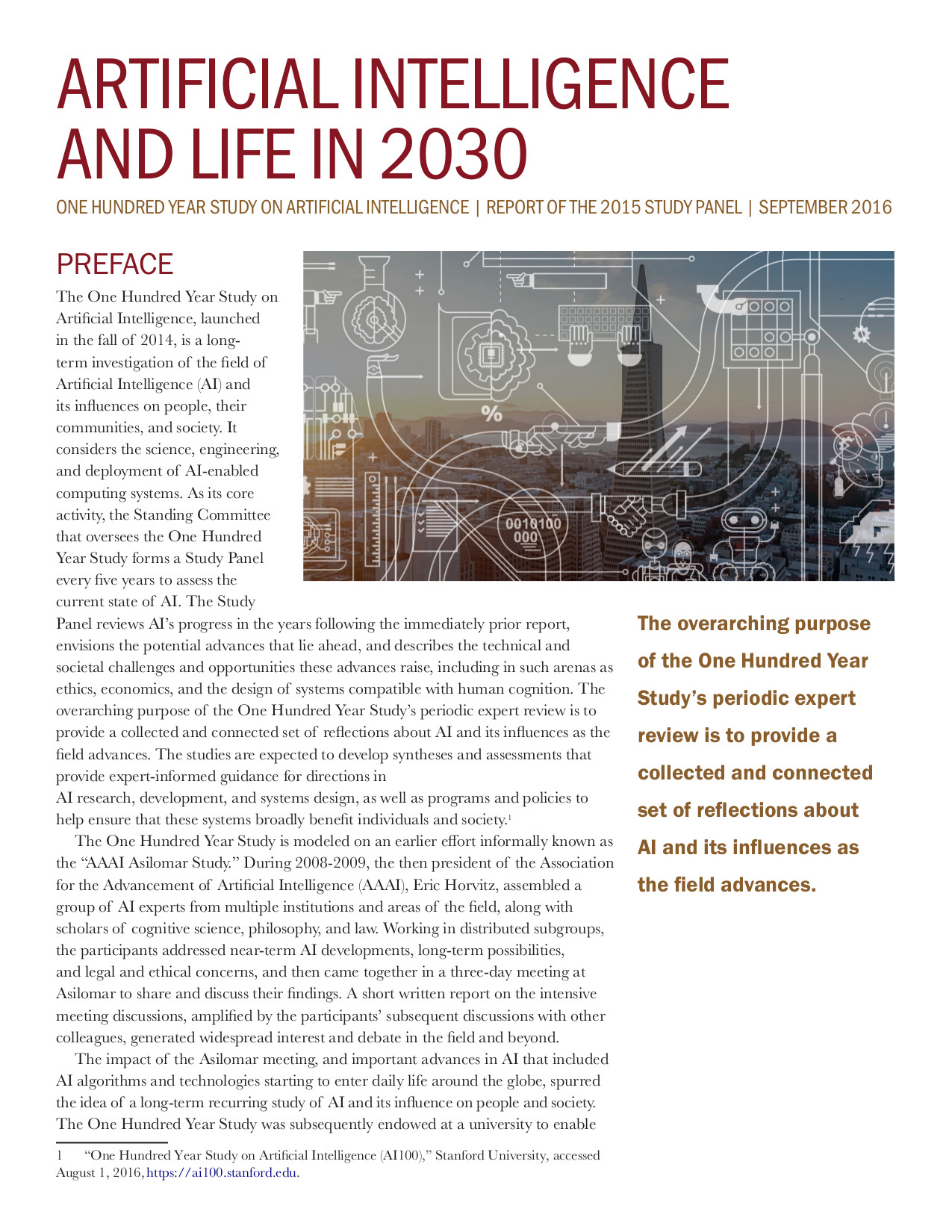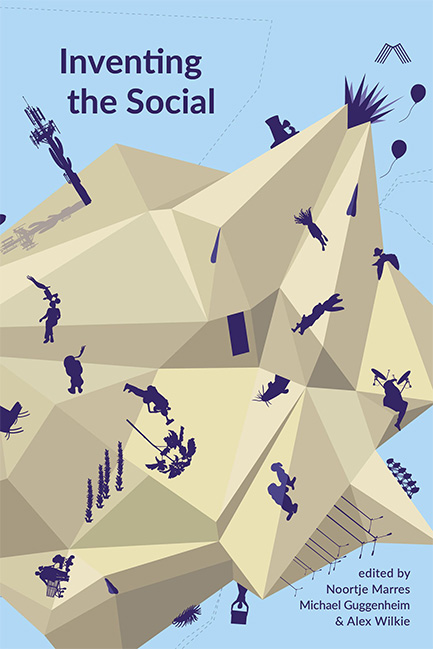AI Now 2019 Report (2019)
Filed under report | Tags: · artificial intelligence, automation, data, employment, ethics, gender, governance, infrastructure, machine learning, policy, power, race, society

This report “examines new research on the risks and harms of AI, including its use by companies to aggressively manage and control workers, its climate impact, and the growing use of facial and affect recognition. We also look at the growing movements that are demanding a halt to risky and dangerous AI, and offer recommendations on what policymakers, advocates, and researchers can do to address these harms.”
By Kate Crawford, Roel Dobbe, Theodora Dryer, Genevieve Fried, Ben Green, Elizabeth Kaziunas, Amba Kak, Varoon Mathur, Erin McElroy, Andrea Nill Sánchez, Deborah Raji, Joy Lisi Rankin, Rashida Richardson, Jason Schultz, Sarah Myers West, and Meredith Whittaker
Publisher AI Now Institute, New York, 12 Dec 2019
Creative Commons BY-ND 4.0 International License
100 pages
Artificial Intelligence and Life in 2030: One Hundred Year Study on Artificial Intelligence (2016)
Filed under report | Tags: · artificial intelligence, computing, industry, machine learning, society, technology

“The Stanford One Hundred Year Study on Artificial Intelligence, a project that launched in December 2014, is designed to be a century-long periodic assessment of the field of Artificial Intelligence (AI) and its influences on people, their communities, and society. Colloquially referred to as “AI100″, the project issued its first report in September 2016. A Standing Committee works with the Stanford Faculty Director of AI100 in overseeing the project and designing its activities. A little more than two years after the first report appeared, we reflect on the decisions made in shaping it, the process that produced it, its major conclusions, and reactions subsequent to its release.
The inaugural AI100 report, which is titled “Artificial Intelligence and Life in 2030,” examines eight domains of human activity in which AI technologies are already starting to affect urban life. In scope, it encompasses domains with emerging products enabled by AI methods and ones raising concerns about technological impact generated by potential AI – enabled systems. The Study Panel members who authored the report and the AI100 Standing Committee, which is the body that directs the AI100 project, intend for it to act as a catalyst, spurring conversations on how we as a society might shape and share the potentially powerful technologies that AI could enable. In addition to influencing researchers and guiding decisions in industry and governments, the report aims to provide the general public with a scientifically and technologically accurate portrayal of the current state of AI and its potential. It aspires to replace conceptions rooted in science fiction books and movies with a realistic foundation for these deliberations.”
Publisher Stanford University, September 2016
Creative Commons BY-ND 4.0 International License
52 pages
Commentary: Barbara J. Grosz & Peter Stone (Communications of the ACM, 2018).
Comment (0)Noortje Marres, Michael Guggenheim, Alex Wilkie (eds.): Inventing the Social (2018)
Filed under book | Tags: · design, life, research, social science, society, sociology

“Inventing the Social showcases recent efforts to develop new ways of knowing society that combine social research with creative practice. With contributions from leading figures in sociology, architecture, geography, design, anthropology, and digital media, the book provides practical and conceptual pointers on how to move beyond the customary distinctions between knowledge and art, and on how to connect the doing, researching and making of social life in potentially new ways.
Presenting concrete projects with a creative approach to researching social life as well as reflections on the wider contexts from which these projects emerge, this collection shows how collaboration across social science, digital media and the arts opens up timely alternatives to narrow, instrumentalist proposals that seek to engineer behaviour and to design community from scratch. To invent the social is to recognise that social life is always already creative in itself and to take this as a starting point for developing different ways of combining representation and intervention in social life.”
Publisher Mattering Press, Manchester, 2018
Creative Commons BY-NC-SA 4.0 License
ISBN 099552775X, 9780995527751
334 pages

